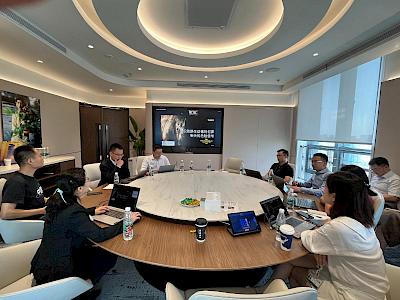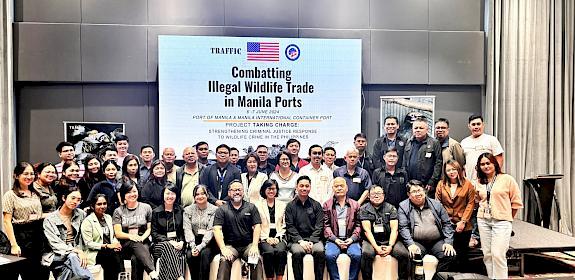TRAFFIC enhances anti-money laundering expertise in China to detect wildlife crime
Criminal networks often leave financial footprints behind when laundering money through financial institutions. TRAFFIC organised two trainings for anti-money laundering (AML) and customs experts, encouraging collaborative investigations into the financial flows of suspicious wild species trade.
As highlighted in TRAFFIC’s Illegal Wildlife Trade and the Banking Sector in China: The Need for a Zero-Tolerance Approach, Chinese banks are increasingly vulnerable to exploitation by illegal wildlife traffickers seeking to launder money. As China is a destination or transit point for many illicit wild species supply chains, several Chinese banks have since taken action to fulfil regulatory obligations, mitigate risks, and work with law enforcement to actively combat criminal networks.
One notable institution is the Chinese division of the Standard Chartered Bank, a key member of the United for Wildlife (UfW) Financial Taskforce. Via a hybrid (in-person and secure live-streamed) event held in the Shanghai Headquarters of Standard Chartered (China) Co., Ltd (SCB), nearly 240 staff joined TRAFFIC’s recent training, exploring strategies to detect suspicious activities and uncover wildlife criminal networks, that are often linked to other international crimes.
Combatting the illegal wild species trade requires unique expertise. It is an important component of anti-money laundering efforts, which is an essential part of compliance”
Mr. Yin Wang, Deputy CEO, SCB China; Cluster Head of CFCC, SCB China and SCB Japan; and Head of CFCC, SCB China
The training featured experts such as Professor Xin WANG from the Law School of Peking University, who presented the evolution and application of money laundering crime provisions in China’s Crime Law since 1997. Additionally, an anti-smuggling law enforcement expert from the Intelligence and Technology Division of Shanghai Customs Anti-Smuggling Bureau (ASB) shared insights into successful convictions and challenges faced by law enforcement staff during financial investigations.
Linda CHOU, AML Project Manager of TRAFFIC China, shared the red flags related to wild species and timber trafficking, covering the typical characteristics, payment methods, crime hotspots, and high-risk industry and client profiles that may indicate suspicious transactions.
Customs officers receive AML training
Following its relatively recent introduction to wider law enforcement training, the day before the training at SCB, TRAFFIC China also discussed AML during the training of over 100 participants from Shanghai Customs Anti-Smuggling Bureau.
Professor WANG, who attended both trainings, delved into the judicial application of money laundering crimes in smuggling cases and the new cooperation model of joint investigations by law enforcement agencies. The SCB experts introduced their bank’s compliance protocols. He expanded on how bank practitioners identify cross-border transaction money laundering risks and the challenges they face in their work.
These alternating training events have created an innovative model for public-private collaboration with support from TRAFFIC, who will coordinate with AML experts, the financial sector, and law enforcement agencies to promote sound collaboration on the use of AML approaches to combat the trafficking of wild species. These training events not only contribute to tackling crimes against wild species, but also enhance the resilience of financial institutions in countering crimes of this nature.
On 2 August 2023, TRAFFIC continued its impact by delivering an AML training for Deputy Directors responsible for Intelligence in the branch levels of Anti-smuggling Bureau of China Customs in Urumqi, Xinjiang Province. The aim was to enhance ASB senior staff’s awareness and capacity in combating wildlife trafficking through the strategic implementation of AML measures.
Financial Flows IWT Toolkit Communicating with the Finance Sector Engaging the financial sector on wildlife trade
Notes:
This training event was kindly supported by The Bureau of International Narcotics and Law Enforcement Affairs (INL), the US Department of State and Norway's International Climate and Forest Initiative (NICFI).
About Norway's International Climate and Forest Initiative (NICFI):

NICFI supports efforts to reduce greenhouse gas emissions resulting from deforestation and forest degradation in developing countries through efforts to improve forest and land management in tropical forest countries and reduce the pressure on tropical forests from global markets.
About Bureau of International Narcotics and Law Enforcement Affairs (INL):

Funded by the United States Department of State Bureau of International Narcotics and Law Enforcement Affairs. The opinions, finds and conclusions stated herein are those of the authors and do not necessarily reflect those of the United States Department of State.
The mission of INL is to minimise the impact of international crime, such as money laundering and criminal gangs, and illegal drugs on the United States, its citizens, and partner nations by providing practical foreign assistance and fostering global cooperation. Visit the Bureau of International Narcotics and Law Enforcement Affairs (INL)'s website.





